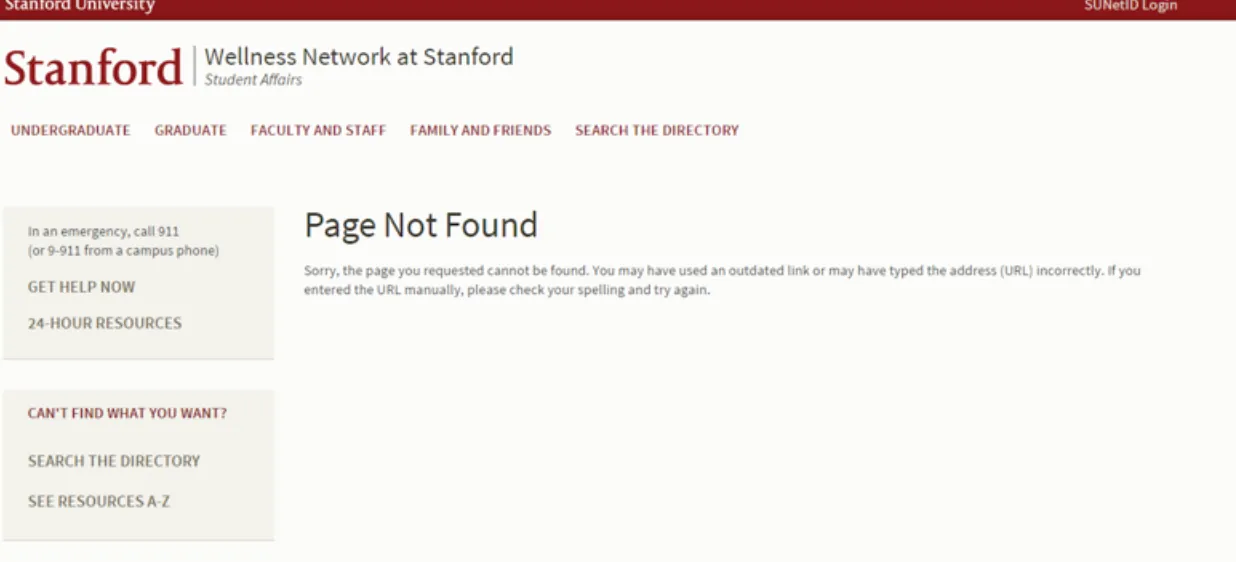Table of Contents
It’s possible you don’t have to, but pretend for a second that you are currently undergoing severe mental distress. You’ve reached the point where you can’t go it alone anymore — you need help.
Where do you go?
There are a few places you could go. You could visit Stanford’s main web page, and click through link after link until you arrive at Vaden Health Center’s homepage. Instead of going through Stanford’s website, you could Google “Stanford Mental Health,” or some variation thereof, and it would direct you to the same website. After clicking around you may be lucky enough to find a page titled “Assisting Students in Distress,” hidden inside a drop-down menu within a drop-down menu.
Several of the mental health resources there look useful, but curious at what else there is, you click a link labeled “Other mental and well-being resources at Stanford.”
In something that feels more in place inside a bleak Terry Gilliam film than on a Stanford-affiliated website, the link takes you outside of the Vaden Health site and straight to a “Page Not Found.”
The link leads outside of Office of Religious Life, and straight to another “Page Not Found.”These two broken links are not the only examples of sloppiness present on the Vaden Health webpage. For several parts of the website, clicking a link or calling a phone number is like flipping a coin.
For CAPS (Counseling and Psychological Services), there is a feedback mechanism in place found by clicking a link inside a drop down menu labeled “How CAPS Works.” Inside, there is a link that supposedly takes the user to a feedback form where current participants can provide impressions of the time they spent inside CAPS. However, at the time of writing, this web page is either blank or has an error message associated with it, depending on the individual user or browser.
This is not to say that absolutely every link associated with the Vaden Health website is broken, that every phone number posted only results in a dial tone, and that there aren’t more resources available to Stanford students. Several of the phone numbers posted on the site, including a prominently featured number labeled “I Need To Talk to Someone Now,” always have someone on the other side of the line. However, the broken links present do hint of a mildly disturbing apathy on part of Vaden, especially when there is an established Stanford-affiliated database which has up-to-date information (and unbroken links) to every mental health resource currently available.
I was completely unaware of this database (wellness.stanford.edu) before I started research for this article. The only way that I became aware of it was when I was discussing some of broken links on the Vaden Health Center site with another student. He told me that all of those resources are now cataloged through wellness.stanford.edu. That was the first time I’ve ever heard of that resource, but when I accessed wellness.stanford.edu, I immediately recognized it.
It was where several of the “Page Not Found” that I discovered were hosted. The broken links led to a complete database of every mental health resource available at Stanford, but there is no reason, on seeing this webpage, to assume that this website is explicitly associated with mental health. The page is vaguely titled “Wellness Network at Stanford,” and neither the words “mental” or “health” appear on any part of the “Page Not Found” web page.
The title of “Page Not Found,” is appropriate, given that there seems to be no way to actually discover wellness.stanford.edu other than prior knowledge of this database’s existence. Nowhere in either the “About Stanford” section of stanford.edu or in the “Campus Life” section of stanford.edu is there a link to wellness.stanford.edu present. The closest thing is an easily overlooked news story about the establishment of the network in an obscure subsection of the “Student Life” section of the Stanford webpage titled “Student Affairs”. Even then, a link is not present on the news story unless you click through another link, and the url (seen on an image in the news story) is slightly blurred and very small. This website cannot be found through intuitive Google searches such as “Stanford Mental Health,” and even for Google searches such as “Stanford Mental Resources,” the link for wellness.stanford.edu is only seen three links below a link to the Vaden Health Center. Most condemningly, if you click a link on the previously mentioned “Student Affairs” page labeled “Student Health,” the only link available is to the Vaden Health website.
What is particularly aggravating is that the only issue here is one of poor attention. The mental health resources exist as does the infrastructure to access those resources. However, due to a few broken links and unclear organization, it is highly unlikely that someone that has little knowledge of Stanford’s mental health resources would get to them before becoming greatly discouraged.
There is a significantly deeper issue at play here. These failures seem to imply a culture of apathy on the part of Stanford’s administration, particularly because these are easily solvable problems. Given this information, the widespread frustration at Vaden can be seen as more than validated, and few administration officials can honestly claim that the mental health of their students is currently a top priority of the university.
Mental health issues are not just a hot talking point to pay lip-service to, something that can be compromised with and set aside to deal with something more visible. It is something that people continue to struggle with, and, mostly due to apathy, it’s an issue that a few more people will deal with completely alone. This apathetic mindset needs to change soon, and the fixing of these links is not something that should be changed immediately. This is not right. This is not acceptable. It can and should be better.








